

Privacy and consent in the age of browsers: The question of WebRTC - ARTICLE 19. Web browsers like Google Chrome, Mozilla Firefox and Safari allow us to view web-based content on all of our devices.
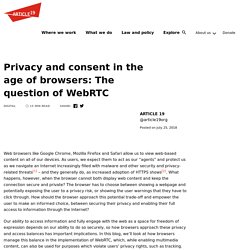
As users, we expect them to act as our “agents” and protect us as we navigate an Internet increasingly filled with malware and other security and privacy-related threats[1] – and they generally do, as increased adoption of HTTPS shows[2]. What happens, however, when the browser cannot both display web content and keep the connection secure and private? The browser has to choose between showing a webpage and potentially exposing the user to a privacy risk, or showing the user warnings that they have to click through. Data privacy - do I need consent?, Iain Bourne. One of the biggest areas of confusion in data protection law surrounds the role of consent.
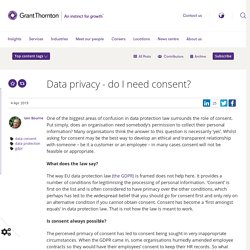
Put simply, does an organisation need somebody’s permission to collect their personal information? Many organisations think the answer to this question is necessarily ‘yes’. Cookie walls don’t comply with GDPR, says Dutch DPA. Cookie walls that demand a website visitor agrees to their internet browsing being tracked for ad-targeting as the “price” of entry to the site are not compliant with European data protection law, the Dutch data protection agency clarified yesterday. The DPA said it has received dozens of complaints from internet users who had had their access to websites blocked after refusing to accept tracking cookies — so it has taken the step of publishing clear guidance on the issue. Bundled Consent – The First Divergence in Member States' Case Law on GDPR. Making the offering of a service conditional upon the data subject's consent to the processing of her or his personal data is a problem under GDPR.
But is bundling consent always unlawful or not? In what may be the first judicial clash among the highest courts of EU Member States on the interpretation of the GDPR, this question has recently been answered differently. Cahier IP6 - La forme des choix. Le design des interfaces n’a pas attendu le Règlement général sur la protection des données (RGPD) pour influencer nos vies.

Pourtant ces questions prennent un tour inédit dès lors qu’elles s’appliquent à des services numériques qui usent et abusent de méthodes de design pour parvenir à nous accrocher et mieux collecter puis traiter nos données, pour des buts poursuivis que nous ne maitrisons pas toujours. Le design de ces services nous affecte tous, car nous dépendons des choix faits par les designers, de ce qui est représenté, et par extension de ce qui ne l’est pas. Dès lors que ces enjeux touchent à des contextes dans lesquels sont traitées et exploitées des données qui nous concernent, le design des interfaces et la manière dont celles-ci nous permettent de prendre des décisions en conscience devient un point central.
L’interface est bien le premier objet de médiation entre la loi, les droits et les individus. Télécharger le cahier IP. Décision 412589. Conseil d'État N° 412589ECLI:FR:CECHR:2018:412589.20180606Publié au recueil Lebon10ème - 9ème chambres réuniesM.
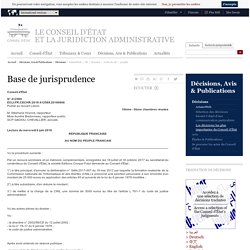
Stéphane Hoynck, rapporteurMme Aurélie Bretonneau, rapporteur publicSCP GADIOU, CHEVALLIER, avocats Lecture du mercredi 6 juin 2018. List of results.
Consumers are not giving informed consent before sharing their financial data. Consumers are not giving informed consent when it comes to sharing their data when signing up to services and apps because terms and conditions are too long and legally complex, research from the London School of Economics and Political Science (LSE) has shown.
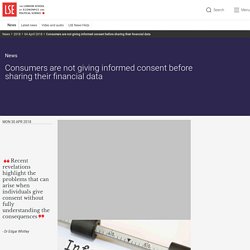
Despite having concerns about privacy, speed and convenience were overriding factors in deciding whether to sign up to an app or service. The research, by Dr Edgar Whitley and Dr Roser Pujadas of LSE’s Department of Management, was commissioned by the Financial Services Consumer Panel and forms the basis for the panel’s call for the government and the Financial Conduct Authority to work together to find an alternative to current terms and conditions in order to facilitate consumers’ genuine, informed consent. Asking re-consent Suzanne Dribble.
ARTICLE29 Newsroom - Guidelines on Consent under Regulation 2016/679 (wp259rev.01) How should we obtain, record and manage consent? Draft gdpr consent guidance for consultation 201703. WP29 Updated Guidance on Consent. Neil Brown reflects on updated guidance on consent, which was issued by the Article 29 Working Party in April 2018 The Article 29 Working Party (WP29) has, with just over a month to go before the GDPR applies, issued its guidance on consent.
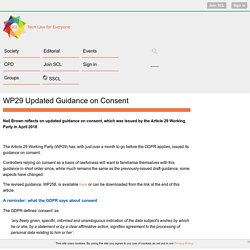
Controllers relying on consent as a basis of lawfulness will want to familiarise themselves with this guidance in short order since, while much remains the same as the previously-issued draft guidance, some aspects have changed. The revised guidance, WP258, is available here or can be downloaded from the link at the end of this article. GDPR consent examples and innovative methods to opt-in. Email marketing list growth is getting harder with GDPR consent and forthcoming ePrivacy regulation.
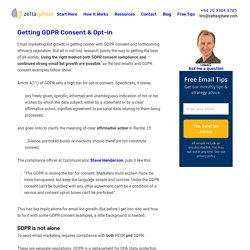
But all is not lost, research points the way to getting the best of all worlds. Using the right method both GDPR consent compliance and continued strong email list growth are possible, as the test results and GDPR consent examples below show. Article 4(11) of GDPR sets a high bar for opt-in consent. Specifically, it states: any freely given, specific, informed and unambiguous indication of his or her wishes by which the data subject, either by a statement or by a clear affirmative action, signifies agreement to personal data relating to them being processed; and goes onto to clarify the meaning of clear affirmative action in Recital 25:
Practical tips for consent under the GDPR. CONSENT FOR TRACKING PURPOSES. Raising the bar – consent under the GDPR. By Steve Wood, Deputy Information Commissioner.
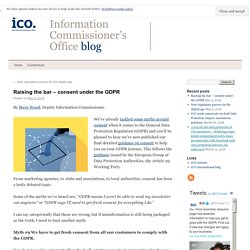
We’ve already tackled some myths around consent when it comes to the General Data Protection Regulation (GDPR) and you’ll be pleased to hear we’ve now published our final detailed guidance on consent to help you on your GDPR journey. This follows the guidance issued by the European Group of Data Protection Authorities, the Article 29 Working Party. From marketing agencies, to clubs and associations, to local authorities, consent has been a hotly debated topic.